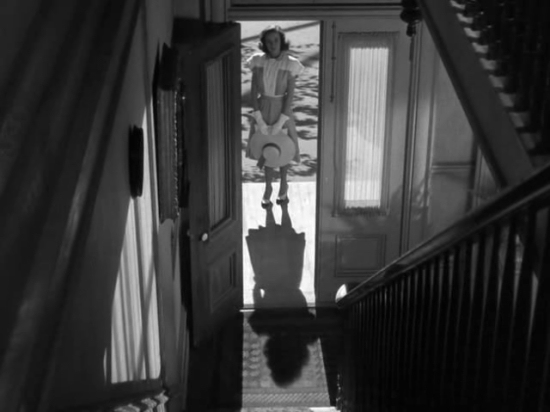
According to the movie's Wikipedia entry, 1943's Shadow of a Doubt was, in 1964, Alfred Hitchcock's favourite of the movies he'd made. I very much liked it, but I don't know if I can agree it's his best. Then again, I didn't fully appreciate Vertigo until I'd watched it a few hundred times. But as it is, Shadow of a Doubt doesn't seem to me like it does more than scratch the surface of its very interesting subject matter. It seems more like the middle of a much better story--I want more material at the beginning and a lot more material at the end.
Teresa Wright plays Charlie, an exuberant and innocent teenage girl named after her Uncle Charlie, played by Joseph Cotton, and the movie concerns his visit to the family home in a small American town. Young Charlie is obsessed with her Uncle in the reckless way of innocent young girls and attached cosmic importance to their sharing of a name, breathlessly proclaiming to him that they're more like twins. I would've liked to have seen this relationship in its earlier stages and maybe have some idea of what inspired the extreme devotion his niece has for him. On the other hand, maybe the fact that we don't know emphasises the arbitrary and spiritual quality of her love.
When Charlie finds out her uncle is a murderer her attitude towards him reverses--she despises and fears him. I would have liked there to have been more about how she felt about how it reflected on her, how she felt now that a man she adored and thought she had some kind of magical connexion to has turned out to be a murderer. Especially since the means by which she discovers his true nature, an engraved ring from one of his victims, is given to her in such a lovely, symbolic way--he slips it on her finger like a wedding ring.

I was reminded of Ace in the Hole in that Uncle Charlie is another man dominated by his cynicism. There's something of the Joker in there, too, as he takes things so often as a self-evident joke--he mockingly puts the ring on her finger, as though to throw in her face all she'd just told him about how they were connected.
It's not really until the end that Charlie shows some intriguing insight into her Uncle's character, saying how, "He thought the world was a horrible place. He couldn't have been very happy, ever . . . He didn't trust people, he seemed to hate them. He hated the whole world. You know, he said that people like us had no idea what the world was really like." It's a profile that fits many a misanthrope. I find myself wondering if the experience with her uncle wouldn't lead Charlie to a similar outlook on life.
Twitter Sonnet #321
Pinkish bubble Tetris men grit their teeth.
Eraser trash compacters squeal loudly.
Rubber shavings reconvene in a wreath.
Blind Batman can swim but only badly.
Orange points dazzle a long crouching baker.
Hollow muffins think esteem when they're pressed.
Horse bullets are there for the bald taker.
The repo quarry man's under arrest.
Indecisive zashiki-warashi cough.
Alternate greens are unseeable hues.
Wet concrete toupees easily fall off.
Paper pansies present some unsought clues.
Charcoal petals melt on an old mirror.
Cola naiads march west flushed with furore.
On a side note, I really loved the hardboiled young waitress at the seedy bar Charlie's taken to by her uncle. I want to see a whole movie about her.


No comments:
Post a Comment